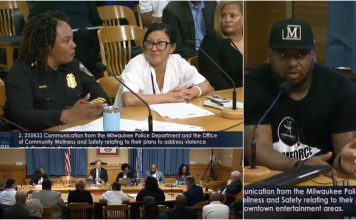Bernard Grofman and Jonathan Cervas inserted a bizarre confidentiality clause into their report that is raising questions.
The Wisconsin Institute for Law and Liberty is calling on the Wisconsin Supreme Court to disclose whether any justices had improper, secret side conversations with the two hired-gun consultants chosen by the court’s liberals to review the legislative redistricting maps.
Wisconsin Right Now previously reported that the consultants, Bernard Grofman and Jonathan Cervas, suddenly inserted a confidentiality clause into their report on the maps. Bizarrely, the clause did not appear in their original contracts with the court, which could net them each up to $100,000, courtesy of Wisconsin taxpayers, for a couple weeks work. The two consultants are professors from California and Pennsylvania.
The confidentiality clause stood out because it seemed out of place in the map report – and because judges are not supposed to have what are technically called “ex parte communications.”
Here is the clause, in their report:

Now WILL, which submitted a map proposal, is raising the issue in a response to the court.
“The consultants’ report indicates that they may have had ex parte communications with members of this Court,” WILL wrote.
They then quoted the consultants’ line from the report, which says, “We agree that we will keep any communications with members of the Court confidential and never disclose the contents of any discussion with members of the Court unless and until given permission by the Court.”
This begs the question of why the passage would be needed if the professors have NOT had ex-parte communications with justices.
“To the extent that any members of this Court have had substantive ex parte communications with the consultants, it should disclose them,” WILL wrote.
“Federal courts around the country have recognized that ex parte communications between a judge and court-appointed expert are inappropriate due to the potential for bias. See, e.g., United States v. Craven, 239 F.3d 91, 102 (1st Cir. 2001); Edgar v. K.L., 93 F.3d 256, 257– 58 (7th Cir. 1996); 29 Fed. Prac. & Proc. Evid. § 6305 (2d ed.) (‘ex parte communications between the judge and the expert … are discouraged’ and ‘may pose ethical issues” or “justify disqualification’).”
Wisconsin law “also reflects this principle, requiring a court-appointed expert witness’s duties to be ‘in writing’ and ‘filed with the clerk,’ or set forth ‘at a conference in which the parties shall have opportunity to participate,’ Wis. Stat. §907.06(1), and the judicial ethics rules prohibit ex parte communications, S.C.R. 60.04(1)(g),” wrote WILL.
“The inability to conduct discovery into any ex parte communications only further reinforces the due process problems here. See Jenkins, 395 U.S. at 428,” WILL wrote.
The two consultants ruled out WILL’s maps and the Republican Legislature’s maps even though WILL’s maps performed best or well on all traditional redistricting criteria mandated by the state Constitution. They supplanted the constitutional criteria for an invented paradigm – a social science theory – they created to game the maps so Democrats get control of the Legislature if Democrats win statewide. WILL is challenging their report’s findings, which tossed out only the conservative-drawn maps and left all of the Democratic ones.
The liberals on the court will choose maps by March 1. The maps redraw the district boundaries for the state’s Assembly and Senate districts. The liberal majority includes Justice Janet Protasiewicz, who declared the maps rigged on the campaign trail after accepting $10 million from the state Democratic Party. Justices are not supposed to prejudge cases, but Protasiewicz has refused to recuse herself.
The state Constitution grants redistricting authority to the Legislature, not to out-of-state hired guns.
Wisconsin Right Now has submitted open records requests for communications between the consultants and the Supreme Court justices, among others.












![Governor Caught Playing Politics with Brillion Residents’ Lives & Livelihood [COLUMN] ron tusler](https://www.wisconsinrightnow.com/wp-content/uploads/2025/07/MixCollage-15-Jul-2025-03-35-PM-9568-356x220.jpg)


![Protecting Portland: No Good Deed Goes Unpunished [REVIEW]](https://www.wisconsinrightnow.com/wp-content/uploads/2025/07/portland-356x220.jpg)

















